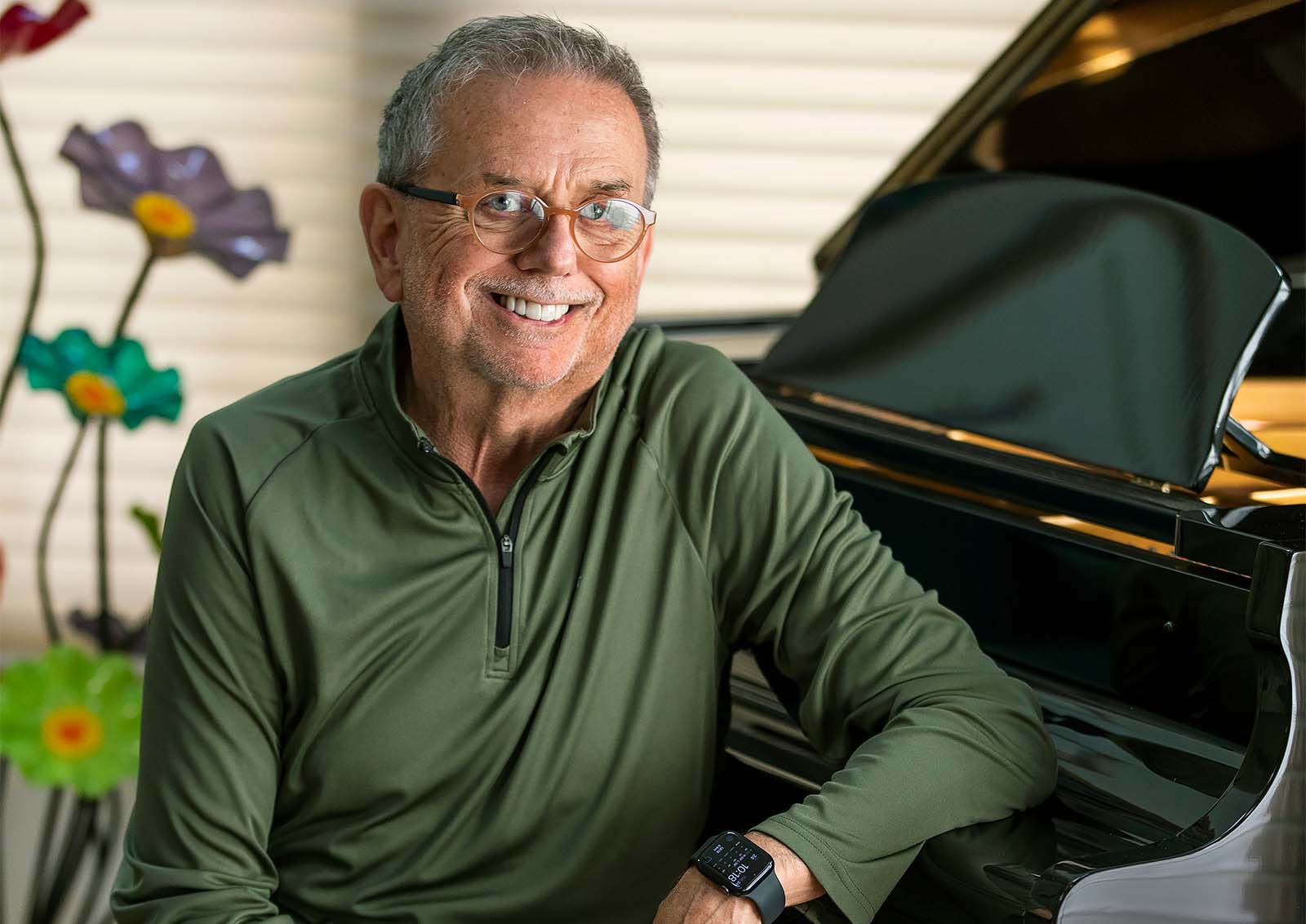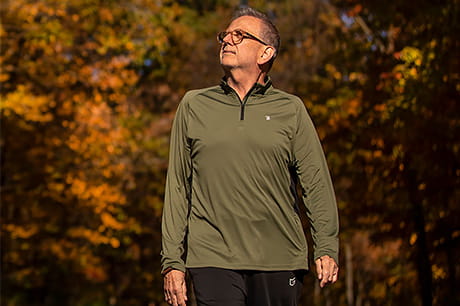Organ recipient gives his own gift of health
Retired physician Charlie White lay in a hospital bed at Geisinger Medical Center in Danville. From his room, he could see the helipad. Although very ill — he estimates weeks to months from death — he was keenly alert to each landing.
“Helicopters were coming in, and patients would come out on stretchers,” he recalls. “And then one landed, and a doctor came out. Holding a box.”
In that box was the liver that would save Dr. White’s life.
Soon, the hospital’s exterior was bathed in green light, the symbolic color of transplantation, and an operation Dr. White wondered if he'd survive was underway.
Transplant surgery isn’t limited to big-city hospitals. Michael Marvin, MD, who leads Geisinger’s liver and kidney transplant program, says he and his team transplant 60 to 90 kidneys and 10 to 20 livers each year, right in Danville.

For Dr. White, who lives in a colorful, art-filled house just outside Danville, having a transplant program five minutes from home was lifesaving.
“If I’d had to travel to Pittsburgh or Philadelphia, I wouldn’t be here,” he says.
Even before his liver began to fail, Dr. White was no stranger to considerations of mortality.
As a medical oncologist who began practicing in the 1970s, he’s seen many advancements in cancer treatment. But, he notes, “I went into oncology knowing there were many people I wasn’t going to be able to save.”
And so, when this former director of medical oncology at Geisinger found himself in the role of patient, he made the most of every day he had left — and he was realistic about his possible death. “When facing my own mortality, I felt empowered to make the most of every moment of my life,” he says. “And I never gave up.”
That resolve, with the support of his late wife, Bonnie, remained strong right up until the day he received the call he didn’t really expect. A liver was available — if he was willing to accept one from a donor with hepatitis C. Some patients are reluctant to do so, but Dr. White wasn’t concerned, even though he did develop the condition after the operation. “It’s highly curable with oral medication,” he says. “The transplant team jumped on it, and I got medication that day. Within two or three weeks, I had no detectable evidence of hepatitis C in my bloodstream.”
More frightening, he says, was when his body began to reject his new liver.
Rejection isn’t uncommon, Dr. Marvin says. Problems arise when patients don’t follow protocols after surgery — such as taking the many prescribed medications. But if transplant patients follow instructions, “rejection can be treated,” he says. “And with the liver, consequences are low. The liver can take a big hit.”
Dr. White admits he “freaked out” when he realized his liver was being rejected, despite his compliance with protocols. But his care team, which also included transplant surgeon Anil Kotru, MD, was unfazed.


You have the power to donate, too.
If you want to donate your organs after death but prefer to keep that directive to yourself — for example, not on your driver’s license — sign up at donatelife.net. You could save your loved ones from having to make a difficult decision, and you’ll make sure your wishes are honored.
Want to help fund Geisinger’s transplant program?
Age isn’t (necessarily) a barrier for recipients.
Many factors are considered when determining who’s eligible for organ transplantation, but contrary to popular belief, there’s no specific age limit.
“I’ve performed a kidney transplant on an 83-year-old,” says Michael Marvin, MD, head of Geisinger’s Transplant Department. “Some older people are in better shape than younger people.”
“You’d think I had the common cold,” Dr. White says. “One of the things that amazed me was how the transplant team approaches problems in a cool, calm and objective manner.”
After about five days of steroid treatment, the rejection was reversed. And the number of medications he takes, and medical appointments he attends, have gradually decreased. Four years after his surgery, at age 73, he says he’s “healthier than ever.”
He’s also grateful — to Geisinger, to everyone who supported him, and especially to his donor and donor’s family, who are unknown to him.
Liver transplant, which usually requires a deceased donor, is bittersweet. Dr. Marvin prefers to focus on the positive aspects. Like the selfless gesture — sometimes made by the donor in life and sometimes by a family during a heartbreaking crisis — that extends life for someone else’s loved one.
“It doesn’t take away the loss,” he says. “But it gives the solace that you can save up to eight lives. From that perspective, it takes the most tragic event and allows some good to come from it.”
The surgeon’s flight to recover organs isn’t just symbolic, he says. Organ recovery is surgery, although the patient has been declared brain-dead and is on a ventilator. Once death is confirmed, an organization called Gift of Life takes over to allocate suitable organs.
“Often, several surgeons are all operating at the same time,” Dr. Marvin says, because time is of the essence. “You’re always grateful to the donor family — and to the recipients who put their trust in you.”
One year after his transplant, Dr. White wrote an essay in which he wondered how he could ever thank his donor, transplant team and everyone who supported him. The question, he decided, “was unanswerable.” And yet he tries.
Along with thinking of his donor daily, Dr. White maintains a liver-shaped memorial garden at his home with a Japanese weeping maple at the center.
He also lives differently, with more gratitude, patience and kindness. “It’s made me a different person,” he says. “I am super positive now.”
And he gives back to Geisinger financially, through his estate planning and a fund he’s set up to support the transplant program. Because it was difficult to get around during his own illness, he wants to help provide transportation for transplant patients. He’s also interested in helping patients pay for medication and supporting education.
But he leaves allocation of the fund largely up to Dr. Marvin and Geisinger Health Foundation, Geisinger’s charitable arm. After all, he trusted the transplant program with his life, and he’s going strong.
“To think this is available in my backyard in Danville, Pennsylvania, is amazing,” he says. “It’s a miracle, and the stars just lined up. I appreciate everything.”
This story originally appeared in PA Health, our quarterly full-color magazine filled with wellness tips, inspiring stories and more.
Sign up to have PA Health sent to your mailbox or inbox 4 times a year, for free.
